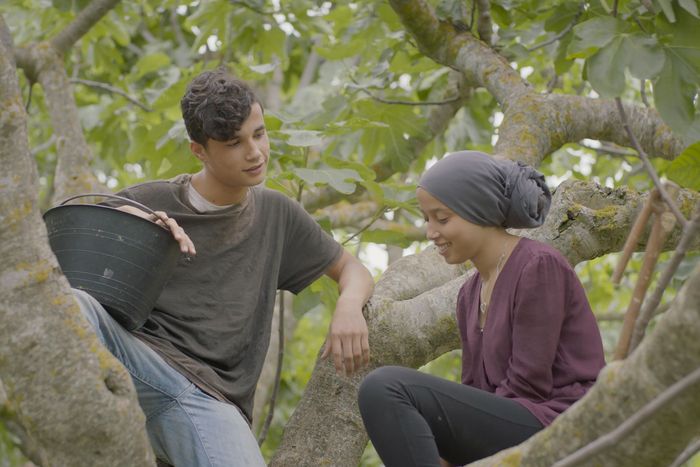
In the final moments of the lovingly shot and ferociously defiant Under the Fig Trees, four young women crowd into a bathroom to get ready for the night ahead of them after hours of picking figs for measly wages under the hot Tunisian sun. Two of them take off their headscarves entirely, one of them pushes it backward to pull out tendrils of hair to frame her face, and one of them keeps hers on. Their choices are as political as they are aesthetic, though French-Tunisian director Erige Sehiri resists emphasizing that in the simplicity of the moment. DonÔÇÖt let that fool you, though: Under the Fig Trees is a big-minded film that grounds its ideas about labor, sexism, faith, and modernity in the zippy rhythms of its charactersÔÇÖ negotiations around friendship, romance, and work. Most of the filmÔÇÖs runtime is people talking, but with evocative dialogue and lived-in performances from mostly first-time actors, itÔÇÖs an unapologetic slice of life.
Filmed in a working orchard in northwest Tunisia, Under the Fig Trees takes place over one day, beginning with women waiting for a ride to work. One of the filmÔÇÖs few wide shots places us under its creamsicle-hazy sky, with dirt roads leading into the mountain fig orchards. Each day, orchard manager Saber (Fedi Ben Achour) ÔÇö referred to as ÔÇ£BossÔÇØ by everyone, even employees decades older than him ÔÇö loads his pickup truck full of workers (all of them either teenagers or elderly) and drives them to the land heÔÇÖs renting. Over 12 or so hours, theyÔÇÖre expected to fill dozens of crates with ripe and unblemished figs, without breaking the treesÔÇÖ branches or talking back to Boss, lest their pay for the day get held back.
As the day goes on, the teens tease, flirt, gossip, and fight, as SehiriÔÇÖs handheld camera spies on them through golden-lit leaves. (The film has a sometimes-voyeuristic feel, nodding to SehiriÔÇÖs past as a documentarian.) Each conversation hints at larger forces dictating the laborersÔÇÖ lives. Sisters Fid├® (Fid├® Fdhili) and Melek (Feten Fdhili) are shocked when MelekÔÇÖs ex-boyfriend Abdou (Abdelhak Mrabti) returns to work as a laborer at the orchard after moving to the coastal city Monastir five years ago. Why would Abdou leave a place with better job opportunities for this? Melek is convinced that she wants to quit school and marry Abdou, but the pragmatic Fid├® has learned the hard way not to trust any men. ÔÇ£You have to keep your guard up,ÔÇØ she tells her younger sister with an older-than-her-years gravitas. Meanwhile, the religious Sana (Ameni Fdhili) and her sarcastic friend Mariem (Samar Sifi) argue about SanaÔÇÖs plan to marry the womanizing Firas (Firas Amri) and convince him to be more conservative. ÔÇ£ThatÔÇÖs nonsense. YouÔÇÖre the one who has to obey,ÔÇØ Mariam reminds her.
The elder workers have their own thoughts about the teensÔÇÖ conversations and arguments, and Sehiri gleans both humor and melancholy from their reactions: cutting to the older women eating their lunch in silence in another part of the orchard, while the teens loudly scroll through Instagram; holding her lens on the motherly Leila (Leila Ouhebi) when she unexpectedly starts singing a mournful lament after warning the girls not to marry someone they donÔÇÖt love. Boss is the filmÔÇÖs obvious villain, a vaping incel who sees all the young women who work for him as prey. (AchourÔÇÖs demeanor turns on a dime, and the one physical altercation he has with a teen employee is a frightening reveal of what heÔÇÖs capable of.) But the film places him within an ecosystem that has many arms of power weighing down upon the proletariat, from gender-based hierarchies to class immobility. The workers know theyÔÇÖre undervalued and expect to be underpaid. They wonÔÇÖt take it silently, though, and Under the Fig Trees finds its spirit in letting its characters talk back.
Their triumphs are on their own terms: a woman successfully barters for better pay, a woman breaks off an engagement. ThereÔÇÖs a fascinating metatextual tension in that only female figs are consumed but the orchardÔÇÖs female workers are banned from eating them by their male boss. Under the Fig Trees finds all these points of gender-based friction and links them together into a call for confrontation. In that bathroom, Sehiri drops out the sound as Fid├®, Melek, Sana, and Mariem share lipstick and blush, pull mirrors out of their socks and hold them to each othersÔÇÖ faces, and take selfies over and over again. All weÔÇÖre directed to focus on are the teensÔÇÖ faces, and the expressions of joy, coyness, and affection that bounce around this intimate space. Under the Fig Trees is concerned with how societal limitations diminish us all, but at its core, the film is a jubilant portrait of individuality that honors how these girls refuse to change each other ÔÇö and to change for anyone but themselves.
Correction: A previous version of this article mistakenly referred to the title of the film as Under the Fig Leaves.
More From This Series
- When an American Pursues Bulgarian Dreams
- Rust DidnÔÇÖt Choose to Echo Its Tragedy, But It Courses Through the Film
- Wicked Is As Enchanting As It Is Exhausting


